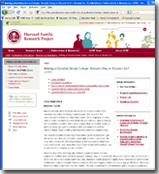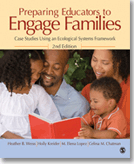The Harvard Family Research Project separated from the Harvard Graduate School of Education to become the Global Family Research Project as of January 1, 2017. It is no longer affiliated with Harvard University.

|
May 2010 Featured Teaching Case: "Daddy Says This New Math Is Crazy"Harvard Family Research Project
|
FINE: The Family Involvement Network of Educators
![]() The FINE Newsletter shares the newest and best family involvement research and resources from HFRP and other field leaders.
The FINE Newsletter shares the newest and best family involvement research and resources from HFRP and other field leaders.
FINE Newsletter, Volume II, Issue 2
Issue Topic: Innovations in Family Engagement
Tips & Tools From Harvard Family Research Project
With a renewed emphasis on school improvement in today’s education climate, many schools and districts are investing in strategies to promote teacher effectiveness. One of these strategies is building teacher capacity to meaningfully reach out to and engage families in support of their children’s learning through the use of teaching cases.
Harvard Family Research Project’s Teaching Case series supports teacher training and professional development in the area of family engagement. Each case highlights a particular challenge that schools, families, and communities may encounter in supporting children’s learning. Accompanying discussion questions encourage readers to think critically about major issues in the case.
In this month’s newsletter, we feature the case "Daddy Says This New Math Is Crazy," which highlights dilemmas that arise when a school’s innovative teaching methods are not developed in collaboration with families and communities and are not well-communicated to these critical stakeholders. The case also draws attention to the importance of family involvement in mathematics, a core mission of Math and Parent Partners (MAPPS), which is described in the National Family, School, and Community Engagement Working Group publication, Taking Leadership, Innovation Change, a compilation of innovative programs to engage families and schools.
About "Daddy Says This New Math Is Crazy"
Beth Martin, a fourth-grade teacher, finds that her students respond well to an innovative mathematics curriculum she is using in her class. However, at home parents complain that they don’t understand why the school has changed its curriculum, and they struggle to help their children complete their homework. Questions at the end of the case encourage readers to think about how Beth and her colleagues might respond to parents’ skepticism about the new teaching methods and how they can support parents’ involvement in mathematics at home. The case also raises questions about how teachers might leverage non-school supports to sustain mathematics learning.
Go to the "Daddy Says This New Math Is Crazy" teaching case.
About Harvard Family Research Project's Teaching Cases
Harvard Family Research Project's Teaching Cases help prepare teachers and other professionals to partner effectively with the families of children in elementary school. These research-based case studies reflect critical dilemmas in family–school–community relations, especially among low-income and culturally diverse families. Each teaching case includes a narrative, discussion questions, and other resources.
 |
"Daddy Says This New Math Is Crazy" and many other cases are available for free on Harvard Family Research Project's website. In addition, a collection of teaching cases entitled Preparing Educators to Engage Families: Case Studies Using an Ecological Systems Framework (Second Edition), is available for purchase from Sage Publications. Access Harvard Family Research Project's Teaching Cases available for free online. |
This article is part of the May 2010 FINE Newsletter. The FINE Newsletter shares the newest and best family involvement research and resources from Harvard Family Research Project and other field leaders. To access the FINE Newsletter Archive, visit www.hfrp.org/FINENewsletter.
